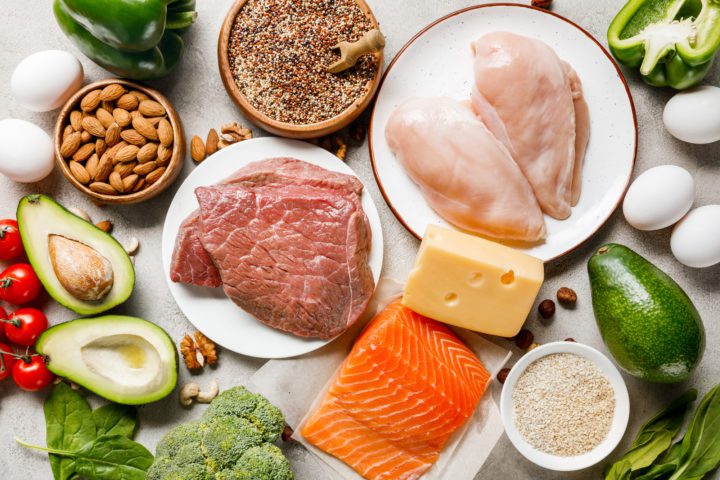The Role of Protein in Weight Loss: Myths and Facts Explained
When it comes to weight loss, protein often takes center stage. Many diet plans emphasize the importance of protein, touting its benefits for muscle-building, metabolism-boosting, and appetite control. However, with so much information circulating, it can be challenging to distinguish between myths and facts. In this article, we will explore the role of protein in weight loss, debunk common myths, and highlight the scientific truths behind this essential nutrient.

Image from Depositphotos
Understanding Protein and Its Importance
Protein is one of the three macronutrients, along with carbohydrates and fats, that our bodies need to function correctly. It is composed of amino acids, which are the building blocks of muscles, tissues, enzymes, and hormones. Protein plays a crucial role in various bodily processes, including muscle repair, immune function, and the production of enzymes and neurotransmitters.
Given its significant role, it is no surprise that protein is often associated with weight loss. High-protein diets are popular because they are believed to promote fat loss, preserve lean muscle mass, and enhance metabolic health. But how much of this is true, and how much is just hype?
One source of protein that has gained popularity is Collagen Protein Powders: Kissed Earth. In addition to its protein content, collagen protein powders are known for their unique benefits in supporting skin, joint, and gut health.
Why Protein Is So Important For Your Body
Myth 1: All Proteins Are Created Equal
Fact: Not all proteins are the same. Proteins can be classified based on their amino acid profile and their source. Complete proteins, such as those found in animal products like meat, fish, eggs, and dairy, contain all nine essential amino acids our bodies cannot produce. Incomplete proteins, found in plant-based sources like beans, legumes, and grains, may lack one or more essential amino acids.
While both types can contribute to weight loss, complete proteins are generally more effective in supporting muscle maintenance and growth due to their comprehensive amino acid profiles. However, with careful planning, vegetarians and vegans can combine different plant-based proteins to ensure they receive all essential amino acids.
Myth 2: High-Protein Diets Are Harmful
Fact: A common misconception is that high-protein diets can damage the kidneys or lead to other health issues. For healthy individuals, high-protein diets are generally safe. The concern about kidney damage primarily applies to individuals with pre-existing kidney conditions.
Studies have shown that increased protein intake can support weight loss and overall health without adversely affecting kidney function in healthy people. However, it is always wise to consult a healthcare professional before making significant dietary changes, especially if you have underlying health conditions.

Image from Depositphotos
Myth 3: Protein Alone Can Lead to Weight Loss
Fact: While protein is a vital component of a weight loss plan, it is not a magic bullet. Weight loss ultimately depends on creating a calorie deficit, where you consume fewer calories than you expend. Protein can aid in this process by increasing satiety, reducing overall calorie intake, and preserving lean muscle mass during weight loss.
However, a balanced diet with adequate carbohydrates, fats, vitamins, and minerals is essential for overall health and sustainable weight loss. Relying solely on protein without considering other nutrients can lead to imbalances and negatively impact health.
Myth 4: You Need to Eat Large Amounts of Protein to See Benefits
Fact: While protein is essential for weight loss, there is a limit to how much your body can utilize. Consuming excessive amounts of protein does not necessarily translate to more significant benefits. Most experts recommend a protein intake of about 0.8 to 1.2 grams per pound of body weight for those aiming to lose weight or build muscle.
For example, if you weigh 150 pounds, you aim for approximately 120 to 180 grams of protein daily. This amount can be adjusted based on individual needs, activity levels, and goals. Consuming protein within this range ensures you get the benefits without overloading your system.
Mini Habits for Weight Loss
Myth 5: Protein Should Only Be Consumed at Meals
Fact: Spreading your protein intake throughout the day can be more beneficial than consuming it all in one or two meals. Regular protein consumption helps maintain steady amino acid levels in the bloodstream, supporting muscle repair and growth.
Including protein-rich snacks between meals can also help control hunger and prevent overeating. Examples of protein-rich snacks include Greek yogurt, nuts, seeds, and protein shakes. This approach can make it easier to meet your daily protein requirements without feeling deprived.
The Science Behind Protein and Weight Loss
Several mechanisms explain how protein aids in weight loss:
- Satiety and Appetite Control: Protein is more satiating than carbohydrates or fats, meaning it can help you feel fuller for longer. This reduces overall calorie intake and helps prevent overeating.
- Thermic Effect of Food (TEF): Protein has a higher thermic effect compared to other macronutrients. This means your body uses more energy (calories) to digest, absorb, and metabolize protein, which can slightly increase your total daily calorie expenditure.
- Muscle Preservation: During weight loss, it is crucial to preserve lean muscle mass, as muscle tissue burns more calories than fat tissue. Adequate protein intake supports muscle maintenance and growth, even in a calorie deficit.
- Metabolic Boost: Consuming protein can increase your metabolic rate due to the energy required for digestion and its role in muscle maintenance. A higher metabolic rate means you burn more calories throughout the day, supporting weight loss.

Image from Depositphotos
Practical Tips for Increasing Protein Intake
Here are some practical tips to help you incorporate more protein into your diet effectively:
- Start Your Day with Protein: Begin your day with a high-protein breakfast, such as eggs, Greek yogurt, or a protein smoothie. This can help control hunger and keep you satisfied until your next meal.
- Choose Lean Protein Sources: Opt for lean protein sources like chicken breast, turkey, fish, tofu, and legumes. These options provide high-quality protein without excessive fats and calories.
- Snack Smart: Include protein-rich snacks between meals, such as nuts, cheese, hummus with veggies, or protein bars. This helps maintain steady energy levels and prevents overeating at mealtime.
- Incorporate Protein in Every Meal: Ensure each meal contains a good source of protein. Add beans to salads, include a portion of lean meat or fish with dinner, and use protein supplements if needed.
- Use Protein Powders: Protein powders, such as whey, casein, or plant-based options, can be convenient for meeting your protein needs. They can be mixed into shakes, smoothies, or general cooking and baking.
Protein is undeniably a key player in the weight loss journey, offering numerous benefits that go beyond just shedding pounds. By understanding the myths and facts surrounding protein, you can make informed choices that support your health and fitness goals. Remember, while protein is essential, a balanced and varied diet, combined with regular physical activity, is the foundation of successful and sustainable weight loss.
Incorporate high-quality protein sources into your daily routine, and consider trying Collagen Protein Powders from Kissed Earth for an additional boost. With the right approach, you can harness the power of protein to achieve your weight loss goals and enjoy a healthier, more vibrant life.
Almond Joy Protein Balls







